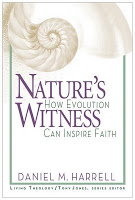Nature’s Witness: How Evolution Can Inspire Faith
 Recently a question occurred to me: what if the way we read the Bible is all wrong? Typically we approach it with the idea that the world was perfect until humans messed it up through sin. Jesus came and gave it all a partial fix. Now we can be restored to relationship with God, and live out our lives knowing that we’ll go to Heaven when we die. Meanwhile life on earth gets worse and worse, and the end seems to be approaching, but God tarries because he is gracious.
Recently a question occurred to me: what if the way we read the Bible is all wrong? Typically we approach it with the idea that the world was perfect until humans messed it up through sin. Jesus came and gave it all a partial fix. Now we can be restored to relationship with God, and live out our lives knowing that we’ll go to Heaven when we die. Meanwhile life on earth gets worse and worse, and the end seems to be approaching, but God tarries because he is gracious.
Lately, bothered by the pointlessness in this view of even redeemed human life, and equally bothered by the awareness that there was plenty of death and suffering on earth even before humans came on the scene, it’s occurred to me that maybe creating humanity in the first place was God’s first movement toward redemption: the creation of “rulers.” Then Jesus came, a divine corrective and clarification of our understanding of humanity’s role in creation. Now the Holy Spirit inhabits us, and we are granted access to a whole dimension “by faith” whereby we are supposed to be doing what Adam and Eve were originally supposed to do: “rule,” or “tend,” the creation as God’s representatives, made in his image. Rather than awaiting a transformed world in the distant future, the Kingdom is operative now. This is what Jesus said, after all. But looking at our typical experience of the Christian life, it’s hard to see it in action. Could we be missing something important, simply because we are looking through the wrong glasses?
I’ve been picking this idea up and putting it down, not sure if I’m being heretical or not. I’ve even written about it here, in a post I published privately, as I do with all my potentially heretical posts. Imagine how I felt when I encountered a similar idea in the pages of Nature’s Witness: How Evolution Can Inspire Faith. Except here it is developed more fully, and set into a fuller context of both science and theology. Perhaps, writes Daniel Harrell,
creation is not so much something good that went bad but something started as good that just is not yet done. It’s as if redemption was the purpose from the beginning. It’s as if the creation is being pulled, called toward that day when all things become radically new in Christ. If perfection never was and is “not yet,” the appearance of evil and suffering (including the suffering and struggle depicted by Darwinian science) is no longer inconceivable. That the serpent got into the garden may suggest that everything was not yet right with the world, even before everything went wrong… What this entails is that you flip your Bible around and read the end as the beginning. Instead of Genesis, what if Revelation is the more plausible place from which to view God’s creative design? What if the new heaven and new earth (Rev. 21:1) already exist in eternity, and we’re just waiting for our experience to catch up with that reality — a compression, if you will, of eternity and time.
Daniel M. Harrell is a long-time pastor and has a doctorate in developmental psychology, and in this book he takes up the subject of evolution and whether it can be harmonized with Christian faith. Often Christians approach science defensively, rather than remembering that if all truth is God’s truth, and if God is the Creator of nature, science too will attest to his character and authority. Harrell points out that science and faith once had a cooperative interest in studying the natural world, but in more recent times, not so much because of scientific knowledge but because of the competing interpretations given to it by some branches of science and the church, this relationship has become much more wary.
This book is a model for how to explore the subject of evolution from a Christian perspective. “Christian theology doesn’t have to submit to accurate scientific findings, only to account for them,” Harrell explains. “Authentic faith strives to believe in what is rather than in what we wish was. All truth is God’s truth, however you look at it and whether you like it or not.”
This is not always easy, of course, and sometimes we need some help thinking things through. I’m an example of that. It’s not that I have intellectual problems with the idea that God could have used evolution; it’s that evolution involves so much pain and death and time that it seriously challenges my understanding of God’s love and his personal nature. This is something Harrell has felt too:
Theology teaches me that the character of creation reflects the character of the Creator — God’s beauty and order and goodness and purposefulness. But as soon as you start thinking about what an evolving creation truly reveals — namely, cruelty and disorder and indifference and randomness — you can’t help but wonder about your faith and about the God to whom that faith points.
Delving with equal energy into both science and theology, Harrell confronts such questions head on. Nature’s Witness is a veritable popcorn popper of ideas, and it will bear (it will require) rereading at some point when my brain has peeled itself off the floor and recovered from the intense workout these pages necessitated. It’s 137 pages long and relatively fast-paced, and it proceeds, I felt, in a somewhat cyclical fashion — ideas and questions surface and resurface rather than being pinned down, exhaustively detailed, and then left there. I found the reading experience to be a little frustrating in this respect. The book’s organizational pattern wasn’t always clear to me as I was reading (which naturally could be my own fault and not the book’s), so I wasn’t able to assimilate the material as well as I would have liked to.
However I don’t have any regrets about reading it, or any annoyance at the prospect of rereading it. In fact I was reminded that one of my main reasons for reading is companionship. I read for instruction too, and for entertainment. But when you’re troubled by questions that strike at the heart of your faith, and unsure of how to move through them systematically, the right book at the right time is — well, an answer to prayer. Even the 10 pages or so of nothing but questions about three quarters of the way through. We all have questions, but too often and for too long they have been casualties of the wars between science and faith, and between biblical literalism and whatever you call its alternative (it can make the Darwinian struggle for survival look pretty tame). We’re all in this together, and this book met a need I have for those questions to be given a full hearing.
I can’t conclude without mentioning that Nature’s Witness is also entertaining. It’s written accessibly, and there are dialogues and jokes sprinkled throughout. As a reward for anyone who’s made it all the way to the end of this post, here is one example:
My uncle told me this joke: Adam is lonely and moping around the garden, so God says to him, “I can make a companion for you. She will harvest the garden and cook you delicious meals. She will tidy up the house and do the dishes. When you disagree, she will always admit she’s wrong first, and she’ll never have a headache.” Bowled over, Adam says, “What will that cost me?” The Lord replies, “An arm and a leg.” Thinking about it, Adam then counters, “What can I get for a rib?”



7 Comments
Dennis King
Thank you for this review, Janet. I like some of the things you say — especially about science and faith not needing to be in conflict, and that “all truth is God’s truth.” Since I haven’t read the book, I have a question. What does Mr. Harrell do with the doctrine of the Fall that seems to permeate the story of the Bible from beginning to end? From the quote in your post, he could be interpreted as saying that from the beginning creation has slowly but surely been moving toward its fulfillment. He mentions the serpent in the quote, but it almost sounds like this was just a part of the imperfection of this world that just needed to get worked out. I’m sure he must have more to say about the doctrine of the Fall than you could mention in a short review. I’m just curious about how it fits into his understanding. Thanks.
Janet
He acknowledges the doctrine of original sin. One place is where I put those ellipses in the excerpt I quoted above. :-) I guess I shouldn’t have left that out! I’ll give you his words, right after “everything was not yet right with the world, even before everything went wrong”:
“You definitely see this in regard to human beings. Adam was never supposed to exist as the epitome of humanity. That designation belongs to Jesus, ‘the last Adam’ (I Cor. 15:45). Jesus was not some contingency plan ‘just in case’ Adam blew it. Knowing free will would end up as free won’t (but allowing it nonetheless for the sake of genuine relationship), God accounts for human freedom through his own free and voluntary sacrifice of himself. ‘Greater love has no one than this,’ Jesus said, ‘that [someone] lay down his life for his friends’ (John 15:13 NIV). Redemption was the plan from the start. Adam and Eve lived as only human (a phrase I often use to excuse my own poor behavior), but Jesus lived as truly human. Christ redeems us, not from our humanity, but into our true humanity. The humanity of Jesus is what God intended from the beginning but what creation (on its own) was never made to produce. Creation has always been aimed toward new creation, the final redemption of all things in Christ (Rom. 8:19-21).”
I guess my simplified understanding of that is that the fall happened, as God knew it would happen, and it was one stage of God’s movement toward redemption. I also understand it (and Harrell’s comments elsewhere) to mean that although there may have been death in the world before Adam and Eve, human sin introduced a new level of evil into the order of things. Because the possibilities for creatures capable of relationship with God and charged with caring for the world were so great, the consequences of their fall were also great. But God is nevertheless prepared for that and able to incorporate it into his purposes for creation.
I don’t pretend to have the book mastered, though.
Janet
By the way… I’d love to know your thoughts on all of this, if it’s possible given just these impressions of the book.
Dennis King
I’m not sure how much of an informed opinion I can give without reading the book. The other reality is that I don’t have much time to explore these issues at any kind of depth. When I do, I really feel out of my league. My only thought is that I think that primarily theology needs to inform our interpretation of science instead of vice versa. Again, I don’t know anything about Mr. Harrell’s book but my concern after reading your review is that we must adhere to historic, orthodox Christian belief regardless of the findings or theories of science. I’m not suggesting that there is no room within Christian orthodoxy for belief in evolution; I don’t think there’s a necessary contradiction there. But is Mr. Harrell being true to the biblical doctrine of the fall of humanity and Christ’s saving work to redeem and restore what has been stolen by sin? Perhaps he is and I’m just not hearing it. I want to be open to fresh understandings of our faith, but we get into trouble when we move from fidelity to the truths of scripture as they have been understood historically by the Church.
Janet
In general, there was a conscious respect for tradition in this book, so if it seems questionable on the attitude toward the fall it’s probably my writing here, as well as the excerpt I chose.
I’m not sure about whether it’s orthodoxy shaping the interpretation of science, or science inspiring a fresh engagement with Scripture, though. It seems to me necessary that we be willing to reconsider our understanding of Scripture in light of new discoveries in archaeology or science.
I know you’ve said, as he does in this book, that our interpretations of the Bible are not infallible. That’s not to say that there aren’t certain irreducible doctrines that define Christianity. But it seemed to me that this book didn’t tinker with any of those core understandings.
Carolin Migliazzo
Hi Janet, I am a new reader of your blog and have found you to be an kindred spirit… here’s a link to my blog if you are interested…http://poeticdialectic.wordpress.com
I was intriqued by your comments about this book review…”It’s not that I have intellectual problems with the idea that God could have used evolution; it’s that evolution involves so much pain and death and time that it seriously challenges my understanding of God’s love and his personal nature.”
And from Harrell “the character of creation reflects the character of the Creator — God’s beauty and order and goodness and purposefulness. But as soon as you start thinking about what an evolving creation truly reveals — namely, cruelty and disorder and indifference and randomness — you can’t help but wonder about your faith and about the God to whom that faith points.”
Harrell’s quote seems aimed at discrediting evolution as God’s method of creation. However intelligent design or a literal creation story does not fare any better, because we know that the world we live in is cruel, disordered, random, as well as beautiful, good and purposeful. So where does that line of thinking lead us as we contemplate the nature of God? I believe it leads us to the philosphical dilemma of the problem of evil, as well as to the story of Job. We must let God be God…
Janet
Hi Carolin, good to meet you!
Harrell isn’t interested in discrediting evolution. I agree with you that we come up against the problem of evil no matter which theory of origins we turn to.